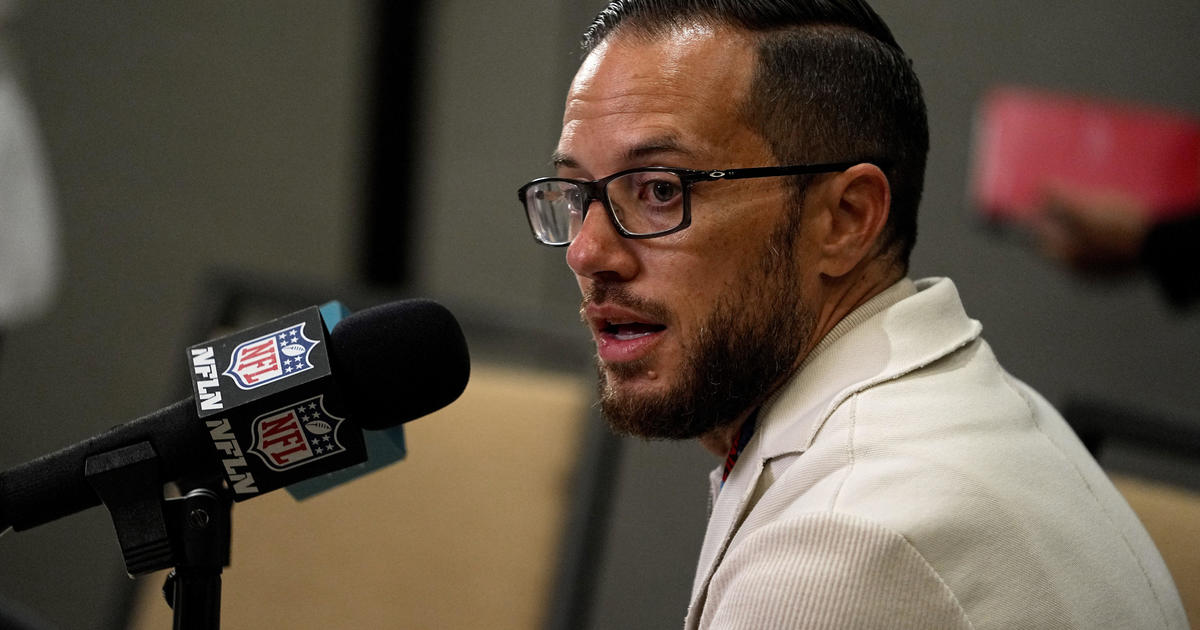Gyms Turn To Smaller Classes & Online Reservations As Safe Reopening Practices
FORT LAUDERDALE, Fla. (CBSMiami/AP) — As gyms begin to reopen, smaller classes and online reservations have become the new normal in the age of the coronavirus.
Mike Weeks and his wife are fitness junkies. During quarantine, they tried home workouts — push-ups, planks, bike riding around town — but it wasn't the same. The semi-retired oil and gas explorer longed for his old gym routine. "To say I missed it immensely is an understatement."
So on May 8, the first day that Life Time gym reopened, the Oklahoma City resident was right there, though "slightly apprehensive."
"I'm 66 years old," he says, and "purportedly in the high-risk category."
For Weeks, the benefits ultimately outweighed the risks. But as the country reopens, even the most dedicated gym rats are concerned about returning to a seemingly healthy habit during a pandemic — and doing it in a place known for sweat, germs and hard-to-clean equipment.
Big-box gyms and local fitness studios are reopening under a patchwork of protocols based on state and local guidance, but most are following these basics: spacing out cardio machines, touchless entry, smaller class sizes, increased cleaning and requiring users to clean all equipment before and after each use.
Mindbody, an online booking platform for fitness classes, salons and wellness appointments, reported all bookings down 70% compared to last year but says they have picked up as states lift restrictions. Florida bookings were up 99% week over week, Texas jumped 94% and Georgia is up 48%.
New Horizon Athletics in Jamestown, Tennessee is not allowing new members since it had to limit class sizes for social distancing. At Body Renew Alaska in South Anchorage, workout-goers have to reserve a 45 minute time slot; only 40 are allowed per slot, and the gym closes at 45 minutes past every hour for a 15-minute deep clean.
CycleBar in Fort Lauderdale, Florida installed a pricey HVAC system and cut class sizes in half, but the pent-up demand has been so overwhelming that they had to add classes for Tuesday's reopening.
At Urban Body Fitness in Atlanta, gymgoers get a touchless thermometer check and their own disinfectant bottle along with a stern warning to clean equipment before and after use. Only 30 are allowed at a time in the 14,000 square-foot gym, which is frequented by employees from the nearby Centers for Disease Control and Prevention.
Owner Rad Slough had plenty of diehards desperate to return — and a slew of members who canceled.
"Some of them are just really scared, and some of them have lost their jobs. The bulk of them are just still freaked out and not coming back for awhile," said Slough, who also had a recent influx of new members because the big-box gym down the street still hasn't reopened.
Slough warns that those who don't follow protocol will have their membership revoked. Experts, though, say there's a lack of uniform standards and enforcement across the fitness industry.
"I'm still very concerned," said Dr. Kristin Englund, an infectious diseases expert at the Cleveland Clinic. "If they're not wearing a mask or wiping down the equipment, what is the ability to enforce that or not allow them to come back?"
Most experts agree: For the majority of healthy Americans under 65, the physical and mental benefits of working out outweigh the risks. And there are always risks.
"Everyone will have to keep in mind that the world we're trying to get back to is going to carry risk," said Dr. Deverick Anderson, director of the Duke Center for Antimicrobial Stewardship and Infection Prevention. "I think responsibility is on both sides of that coin. Don't just rely on your gym to do everything. You've got to play a part in this process as well."
Spots at fitness classes will likely be harder to come by because of reduced capacity. Many will likely require reservations, making it more difficult to squeeze in last-minute workouts. And after months of being shuttered, many small studios across the United States will struggle to reopen at all.
Kelli McMullen's yoga studio in Brighton, Michigan went from generating about $40,000 a month before the pandemic to $1,000 from donations. Most members of her 23-person staff are teaching online classes for free. The Space will likely be closed for three more months. When it reopens, capacity will be reduced by two-thirds and it'll likely close for an hour in between sessions for deep cleaning.
"If it's much longer than June, I can't keep going into my personal funds," McMullen says, "so we're going to have to have people pay for online classes."
Aaron Fowler brought along a mask when he returned to his interval training class at CITYROW last weekend but quickly discarded it, finding it too difficult to breathe. He also wore gloves and used his own hand towel. The rowers were much further apart, and the class was capped at only seven participants.
"Just to be able to work out for an hour to kind of of relieve some of that stress was pretty key for me," said Fowler, 35, who oversees transportation at an Atlanta university. He signed up for the next class, but will assess the risk day by day. He expects the virus threat to last a year.
"And," he says, "I don't know if I can go that long without it."
For those heading back to the gym, there are many legitimate concerns about how fitness centers can safely reopen without furthering the spread. But infectious disease experts say risk can be greatly mitigated by following some simple rules.
"There may be scenarios where (the gym) can't develop a system whereby your risks are lower, so the responsibility falls to you," said Dr. Deverick Anderson, director of the Duke Center for Antimicrobial Stewardship and Infection Prevention.
WASH, REWASH, REPEAT
"When you put down that dumbbell, you've got to immediately wash your hands. You've got to assume that if you were to accidentally touch your eyes, you're putting yourself at risk," Anderson says.
Bring your own towel, wash every piece of equipment before and after using it so you're not relying on whether someone before you followed the rules. Most gym wipes aren't strong enough, so bring your own disinfectant or inquire what the gym is using. And before you hop on the treadmill or grab your weight, let the spray sit on the equipment for a minute or two, he says.
Surfaces, not people, may offer more opportunities for contact with the virus. Experts have said different things, but some believe the virus can last for up to 24 hours on cardboard and up to two or three days on plastic and stainless steel. But the federal Centers for Disease Control says — and re-emphasized last week — that surfaces are not thought to be a major path for transmission.
If respiratory droplets from an infected person do land on surfaces, "they absolutely can be spread there, and it's a very common thing to wipe sweat off your forehead," said Dr. Kristin Englund, an infectious disease expert at Cleveland Clinic. "But if you wipe past your eyes or nose, you're going to be carrying the virus there."
CARDIO
Cardio workouts and fitness classes may pose increased risks.
"Being on an elliptical machine and breathing very heavily on that, those activities make me anxious about being able to spread the virus more heavily because people are going to be panting and sweating," Englund said. "I think there's a greater risk for taking classes where you are going to be doing a lot of cardio."
Anderson agrees that there should be at least six feet of distance in cardio settings — along with an understanding that the risk there is "not the same as walking into the grocery store six feet apart."
MASKS
Anderson acknowledges that it's impractical to wear masks while sweating, but he suggests wearing them to enter and exit facilities. Employees, he says, should definitely be wearing masks.
An abundance of signs stressing hand washing and equipment cleaning protocol is helpful, at first, but eventually people become inured to them, he says.
PERSONAL CHOICE
To some degree, since guidance varies by city and state, your workout will be as safe as you choose to make it. Each facility is bound to have folks who are and aren't following safety precautions.
Bottom line: Is it worth it?
Says Anderson: "For many people, I think the answer to that is yes. For some people, the answer to that is still no as we learn more and more about this disease and who is at most risk."
RELATED:
Drive-Through Testing Locations
Track The Spread Of The Coronavirus In Real Time
How To Make Your Own Face Mask
(© Copyright 2020 CBS Broadcasting Inc. All Rights Reserved. The Associated Press contributed to this report.)



